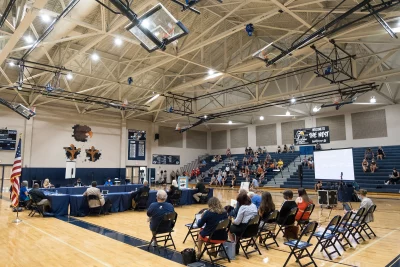
Share this story
- Election results are in. Republicans have gained a stronger foothold over the General Assembly and won the majority in the state Supreme Court. Find out more about the results and the implications for North Carolina’s education system.
- Election results show strong gains for Republicans statewide but more split results in races for North Carolina's congressional delegation. #nced #ncga
|
|
Nearly 4 million North Carolinians voted in this year’s midterm elections for offices from the U.S. Senate all the way down to local races. The results from this week could have a huge impact on the state’s education policy in the coming years.
As EdNC previously reported, roughly a third of North Carolina’s school board seats were up for election this week, and a majority of seats were up for election in 45 school districts. Stay tuned for a deep dive into these results in the coming days. All of the state legislature seats were up for election as well, alongside two state Supreme Court seats, 14 U.S. House seats, and one U.S. Senate seat.
There are still a few votes that could trickle in between now and the deadline to return absentee ballots on Monday. These results will also remain unofficial until they’re certified by local boards of election on Nov. 18 and eventually the State Board of Elections on Nov. 29.
To find results for all of the state’s races, go to the State Board of Elections website.
Federal races
North Carolina had one of its two U.S. Senate seats up for election this year. According to unofficial results on Wednesday afternoon, Republican Ted Budd beat Democrat Cheri Beasley by roughly four points. Budd previously served three terms representing North Carolina in the U.S. House of Representatives, while Beasley was the chief justice of the state Supreme Court.
This seat was left open when U.S. Sen. Richard Burr announced his retirement, and it was identified as a key race as both parties are trying to gain control of the Senate. Republicans have led North Carolina in the U.S. Senate since 2014.
All of North Carolina’s U.S. House seats were also up for election this year, including the new 14th District the state earned after the 2020 census.
North Carolina’s congressional delegation will include two additional Democrats in the new year and will now be evenly split by party, with seven Democrats and seven Republicans.
Here’s who won each district, according to unofficial results as of Wednesday:
- District 1: Don Davis (D).
- District 2: Deborah Ross (D).
- District 3: Greg Murphy (R).
- District 4: Valerie Foushee (D).
- District 5: Virginia Foxx (R).
- District 6: Kathy Manning (D).
- District 7: David Rouzer (R).
- District 8: Dan Bishop (R).
- District 9: Richard Hudson (R).
- District 10: Patrick McHenry (R).
- District 11: Chuck Edwards (R).
- District 12: Alma Adams (D).
- District 13: Wiley Nickel (D).
- District 14: Jeff Jackson (D).
For four of these representatives – Davis, Edwards, Nickel, and Jackson – it will be their first term.
Much of education policy is handled at the state and local level, but there are a few key things to look out for from our representatives in Congress. For starters, they handle federal spending, which includes funding the U.S. Department of Education and other federal education programs. It also includes policies like the influx of cash North Carolina’s community colleges and school districts received during the pandemic.
Federal legislation can also impact day-to-day operations in schools. For example, school nutrition advocates are calling on Congress to reauthorize a bill that would make it easier for students to qualify for free meals. Republican U.S. Rep. Virginia Foxx, who serves on the House Education Committee, was instrumental in getting legislation extending some child nutrition waivers passed over the summer. There have also been recent federal bills that have to do with school safety, including funding for school-based mental health services and security.
State races
The results in the North Carolina General Assembly races will set up some interesting dynamics in the coming long session. For years now, Republicans had a majority in the legislature, but in 2018, they lost their supermajority, otherwise known as a veto-proof majority.
The result has been that Democratic Gov. Roy Cooper has been able to wield more influence, including vetoing the biennium budget in 2019. Republicans, unable to get around that veto, let the state move forward without a new budget. It was only in 2021 that another biennium budget was passed, and legislative Republican leaders had to work with Cooper to make sure that the spending plan they crafted would not be vetoed again.
After last night’s elections, that dynamic will change. Unofficial results show Republicans have a veto-proof majority in the Senate, but just barely. They have 30 out of 50 seats, which means that if a veto went to that chamber for override, every single Republican would have to vote the same way to accomplish anything.
In the House, Republicans did not manage to gain enough seats to overcome vetoes, but they are close. They needed 72 of the chamber’s 120 seats for a supermajority, and they got 71, according to unofficial results. That means a Democrat would have to join with Republicans in order to overcome a veto. Or Republicans could try another tactic: scheduling a veto vote at a time when not all Democrats are in the chamber, something the House successfully tried with the 2019 biennium budget. However, that vote then went to the Senate, which never ended up taking it up.
As far as individual races go, there were a number that will have a particular impact on education in the state. One of the most important was in New Hanover County where Republican Sen. Michael Lee narrowly kept his seat. He chairs both the education and education appropriations committees.
Of course, the most influential Republicans in the legislature — in general and on education — are the respective Senate and House leaders. Both Senate President Pro Tem Phil Berger, R-Rockingham, and House Speaker Tim Moore, R-Cleveland, ran unopposed in their districts and won.
In the House, John Torbett, R-Gaston, ran unopposed and kept his seat. He is the chair of the House education and education appropriations committees and also runs the House Select Committee on an Education System for North Carolina’s future.
His colleague Rep. Hugh Blackwell, R-Burke, also ran unopposed in his district. He also chairs the House education committee and is a chair on the House Select Committee on an Education System for North Carolina’s future.
The other big race was the state Supreme Court. This one is important because the court just issued a decision last week supporting a lower-court order requiring the state to transfer the funds necessary to pay for the second and third years of a plan in the Leandro case. That decision came down 4-3 and ran along party lines, with Democrats in the majority.
After this election, the Republicans now have a 5-2 majority. It is unclear what, if any, impact that will have on Leandro going forward. However, the case has been going since the 1990s and has been remanded to the trial court, so it is within the realm of possibility that it could come before the state’s top court again at some point.
Meet your other new state legislators
Editor’s Note: This section was written for and published in the North Carolina Tribune by its editor Colin Campbell.
There will be a lot of new legislators in January, and because many of them weren’t in competitive districts, odds are you haven’t heard much about them.
Here are the new kids on the block who got elected with the benefit of relatively safe seats:
House Democrats
- Rep.-elect Gloristine Brown, currently the mayor of the small town of Bethel, will take the Pitt County seat being vacated by Rep. Kandie Smith.
- Rep.-elect Ya Liu will represent a new district in western Cary and Morrisville created by Wake County’s population growth. She’s a Duke Law faculty member and Cary Town Council member who will be the legislature’s only Chinese-American member.
- Rep.-elect Tim Longest will fill the Raleigh seat long held by Rep. Grier Martin, who resigned earlier this year for a new job at the Pentagon. He is an attorney who has clerked at the state’s appellate courts.
- Rep.-elect Maria Cervania is moving up from her current role as a Wake County commissioner to replace Rep. Gale Adcock, who’s joining the Senate. She is a biostatistician, epidemiologist and researcher.
- Rep.-elect Charles Smith is a former prosecutor who now specializes in contract law. He’ll be replacing Rep. Billy Richardson in Cumberland County.
- Rep.-elect Frances Jackson will replace Rep. John Szoka, who ran for Cumberland County commissioner after his district was redrawn to favor Democrats. Jackson worked as a magistrate, high school teacher and transit analyst.
- Rep.-elect Renée Price is an Orange County commissioner who will fill the seat vacated by Rep. Graig Meyer, who will join the Senate.
- Rep.-elect Kanika Brown is a community liaison for a Winston-Salem nonprofit, working on school initiatives and other projects. She’ll replace retiring Rep. Evelyn Terry.
- Rep.-elect Tricia Cotham will be returning to the House to represent a newly drawn district in southeastern Mecklenburg County. The career educator previously served from 2007 to 2016.
- Rep.-elect Eric Ager will replace his father, John Ager, in the Buncombe County district. Both father and son are farmers.
- Rep.-elect Lindsey Prather will replace Rep. Brian Turner in Buncombe. She’s a teacher and community activist from Candler.
- Rep.-elect Sarah Crawford is moving over from the Senate to fill a newly created House district in Northeast Raleigh.
House Republicans
- Rep.-elect Jarrod Lowry is a community relations manager with Mountaire Farms and a Lumbee. He’ll replace Rep. Charles Graham in Robeson County as the only American Indian serving in the legislature.
- Rep.-elect Joe Pike is a Harnett County restaurant owner representing a newly created district.
- Rep.-elect Celeste Cairns is an auditor and accountant who will replace retiring Rep. Pat McElraft in Carteret County.
- Rep.-elect Neal Jackson is a Baptist pastor from the rural Bennett community in southeastern Randolph County who will replace retiring Rep. Allen McNeill.
- Rep.-elect Jennifer Balkcom is a mortgage loan officer and member of the Henderson County planning board. She’ll replace Rep. Tim Moffitt, who’s joining the Senate.
- Rep.-elect Brian Biggs is a Randolph County school board member who defeated Rep. Pat Hurley in the primary.
- Rep.-elect Kevin Crutchfield is a farmer, sign company owner and real-estate developer from Midland, a small town on the southern end of the Cabarrus County.
Senate Democrats
- Sen.-elect Lisa Grafstein is an attorney with Disability Rights N.C. who will represent a newly created Senate district in North Raleigh.
- Sens.-elect Graig Meyer (Orange County), Kandie Smith (Pitt County) and Gale Adcock (Wake County) are all moving from House seats.
Senate Republicans
- Sen.-elect Benton Sawrey is an attorney from Smithfield who will represent a new Johnston County district.
- Sen.-elect Eddie Settle is a Wilkes County commissioner who owns a farm and a printing business.
- Sen.-elect Brad Overcash is an attorney and longtime local Republican Party leader who’s replacing Sen. Kathy Harrington in Gaston County.




